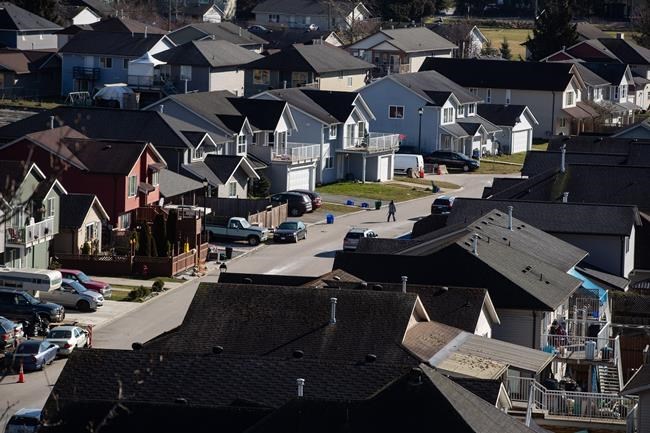OTTAWA — Home sales in Canada fell in March, while prices were up 11.2 per cent compared with a year earlier, Canadian Real Estate Association said Tuesday.
The association said home sales in March were down 16.3 per cent compared with the same month last year when they hit an all-time record.
On a month-over-month basis, seasonally adjusted home sales in March were down 5.4 per cent.
TD Bank economist Rishi Sondhi said part of the decline in March probably reflected buyer fatigue to some degree following several months of robust activity, as buyers pulled forward their purchases ahead of higher rates.
The Bank of Canada raised its key interest rate target by a quarter of a percentage point at the beginning of March and by an additional half of a percentage point last week. The moves drove prime rates at commercial banks higher, since they use the central bank's key rate as reference when setting variable mortgage rates.
Rates for five-year fixed-rate mortgages have also risen in recent weeks as the yields of five-year government of Canada bonds have climbed higher.
"And, with the Bank of Canada set to hike rates aggressively, home sales are likely to trend even lower moving forward," Sondhi wrote in a report.
"This should help balance the market and weigh on home price growth. Indeed, our forecast anticipates significant softness in average home price growth in the second half."
The drop in sales came as the number of newly listed homes fell 5.5 per cent on a month-over-month basis in March.
CREA said the decline in new listings was led by Greater Vancouver, the Fraser Valley region in B.C., Calgary and the Greater Toronto Area.
The actual national average home price was $796,068 in March, up from $715,696 in the same month last year. The association said excluding Greater Vancouver and the Greater Toronto Area, two of the most active and expensive housing markets, cuts $163,000 from the national average price for March this year.
Royal LePage said according to its home price survey that the national aggregate home price was up 25.1 per cent year-over-year in first quarter at $856,900, the highest gain on record since the company began tracking prices.
Royal LePage CEO Phil Soper said the real estate firm anticipated a strong first half of the year, with a moderating of real estate markets thereafter.
"The first quarter of the year was so strong, however, that we are bumping up our 2022 outlook," Soper said in a statement.
"And, home prices will continue to climb in the months ahead as a result of our relentless low supply-high demand imbalance."
Royal LePage is now forecasting that the aggregate price of a home in Canada will increase 15.0 per cent in the fourth quarter of 2022, compared with the same quarter in 2021. The outlook compared with an earlier forecast that called for a 10.5 per cent increase.
In a separate report, Canada Mortgage and Housing Corp. said the seasonally adjusted rate of housing starts came in at 246,243 units, compared with 250,246 in February.
The drop came as the pace of urban starts slowed by two per cent to 220,708 in March. The annual rate of starts for apartments, condos and other types of multiple-unit urban projects fell five per cent to 154,876, while the pace of single-detached urban starts rose eight per cent to 65,832.
Rural starts were estimated at a seasonally adjusted annual rate of 25,535 units.
The six-month moving average of the monthly seasonally adjusted annual rates of housing starts was 252,497 in March, down from 253,296 in February.
This report by The Canadian Press was first published April 19, 2022.
The Canadian Press



